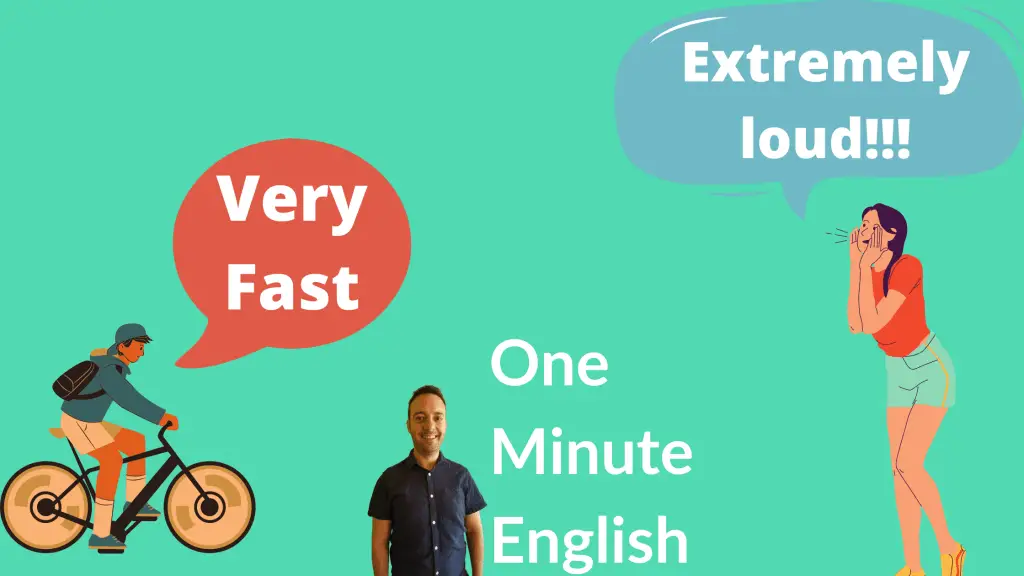Usamos intensificadores para hacer los adjetivos más fuertes.
Aquí hay una lista de los intensificadores más comunes:
- absolutely
- amazingly
- astoundingly
- at all
- awful
- bitterly
- bloody
- completely
- crazy
- dead
- dreadfully
- colossally
- especially
- exceptionally
- excessively
- extremely
- extraordinarily
- fantastically
- frightfully
- fully
- hella
- incredibly
- insanely
- literally
- mad
- mightily
- outrageously
- particularly
- phenomenally
- precious
- quite
- radically
- rather
- real
- really
- remarkably
- ridiculously
- so
- somewhat
- strikingly
- super
- supremely
- terribly
- terrifically
- too
- totally
- unbelievably
- veritable
- very
Muchos intensificadores tienen el mismo significado, pero algunos son diferentes y otros sólo funcionan en determinadas situaciones (sumamente confiados, amargamente decepcionantes).
Veamos algunos ejemplos de oraciones:
I am absolutely delighted with my exam results.
I didn’t like the movie at all.
I was bitterly disappointed after the game.
I am dreadfully bad at football.
I am especially good at tennis.
That game is dead easy.
The new Red Dead redemption game is insanely good.
I am quite busy at the moment.
He is rather tall.
It is so hot in here.
That company are super cool to work for.
I am totally late for work.
¿Qué son los intensificadores?
Los intensificadores hacen que los adjetivos sean más fuertes. Los intensificadores Very y really son muy comunes.
I did well in the exam.(90%)
I did really well in the exam. (98%)
Algunos adjetivos ya son fuertes, así que no podemos usarlos very y really con ellos. Podemos usar absolutely o completely con adjetivos fuertes.
I did terrible in the exam. (20%)
I did absolutely terrible in the exam. (5%)
I did really terrible in the exam.
Los intensificadores dan más énfasis a lo que quieres decir. Hacen que tu frase sea más extrema y por lo tanto más interesante.
Algunos intensificadores son regionales y sólo se usan en ciertas partes del mundo. Los intensificadores también se hacen populares durante un período de tiempo determinado y luego pierden popularidad.
Totally(U.S.A,)
He is totally crazy about you.
Literally (U.K, U.S.A)
This is literally the best thing I have ever eaten.
Heaps (Australia)
This beer is heaps good.
Mad (Ireland)
The pub is mad busy.
Algunas personas encuentran molesto el uso excesivo de los intensificadores porque si se hace todo extremo, es difícil saber cuándo algo es realmente extremo.
Los intensificadores normalmente vienen antes de un adjetivo.
That football player is very bad.
I think that is absolutely terrible.
Intensificadores débiles
Algunos ejemplos de intensificadores débiles son
Quite
Muestra que algo es un poco más fuerte de lo que se esperaba, pero no es tan fuerte como mucho.
The movie was quite good but I thought it would have been better.
It is quite warm today.
Pretty, Fairly
Pretty y fairly se utilizan para algo que no era tan bueno como se esperaba.
The movie was fairly good.
He is pretty good at football but not brilliant.
Intensificadores con comparativos y superlativos
Podemos usar far, much, or a lot para los adjetivos comparativos.
He is far better than me at football.
He is much better than me at football.
He is a lot better than me at football.
Podemos usar by far, or easily con adjetivos superlativos.
He is by far the best at football.
He is easily the best at football.
Adjetivos como intensificadores
A veces usamos adjetivos como intensificadores
Aquí hay una lista con oraciones de ejemplo:
Absolute
He was absolute rubbish in that game.
Complete
That is complete nonsense.
Total
That is total rubbish.
Real
That coat is real nice.
Utter
That is utter nonsense.


